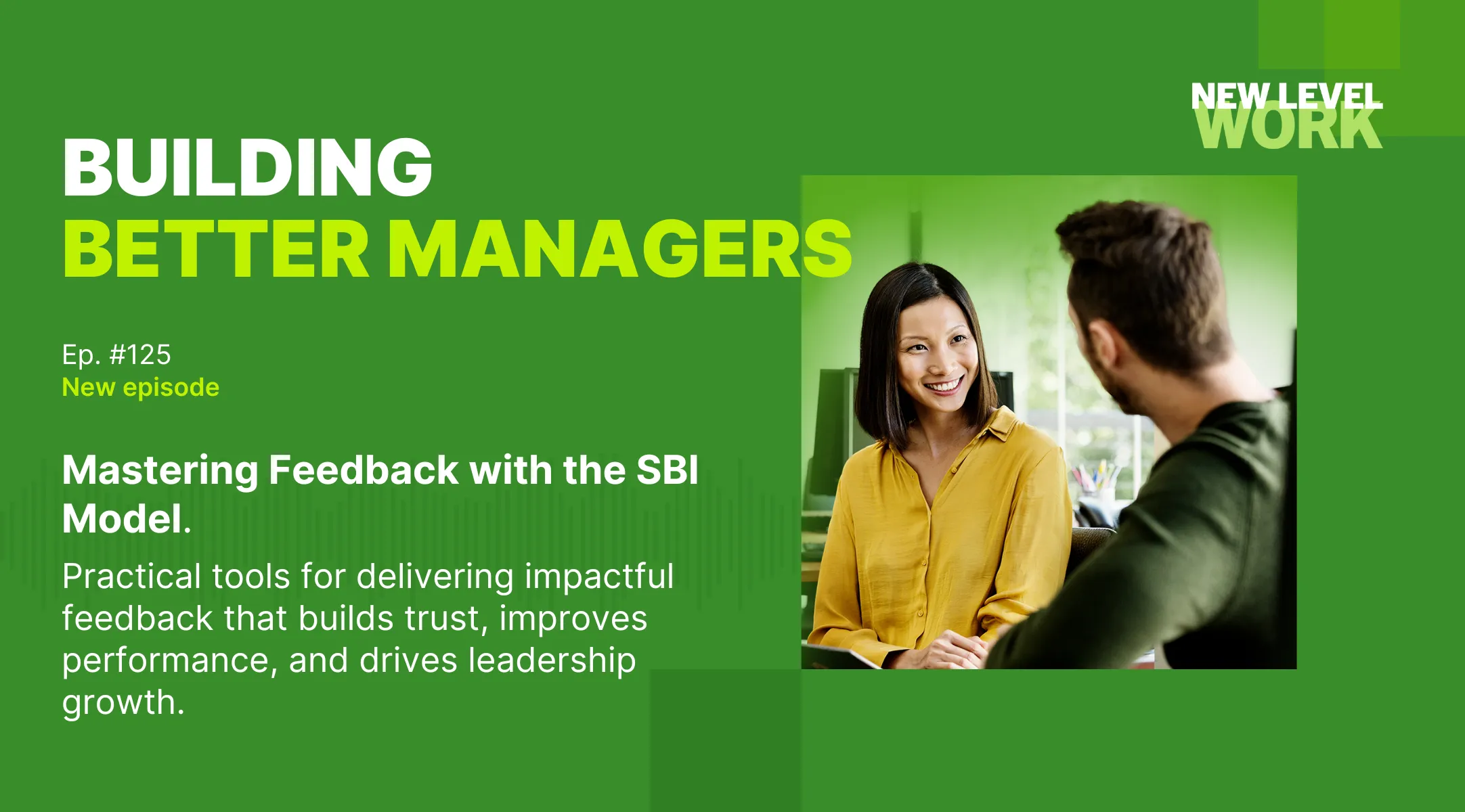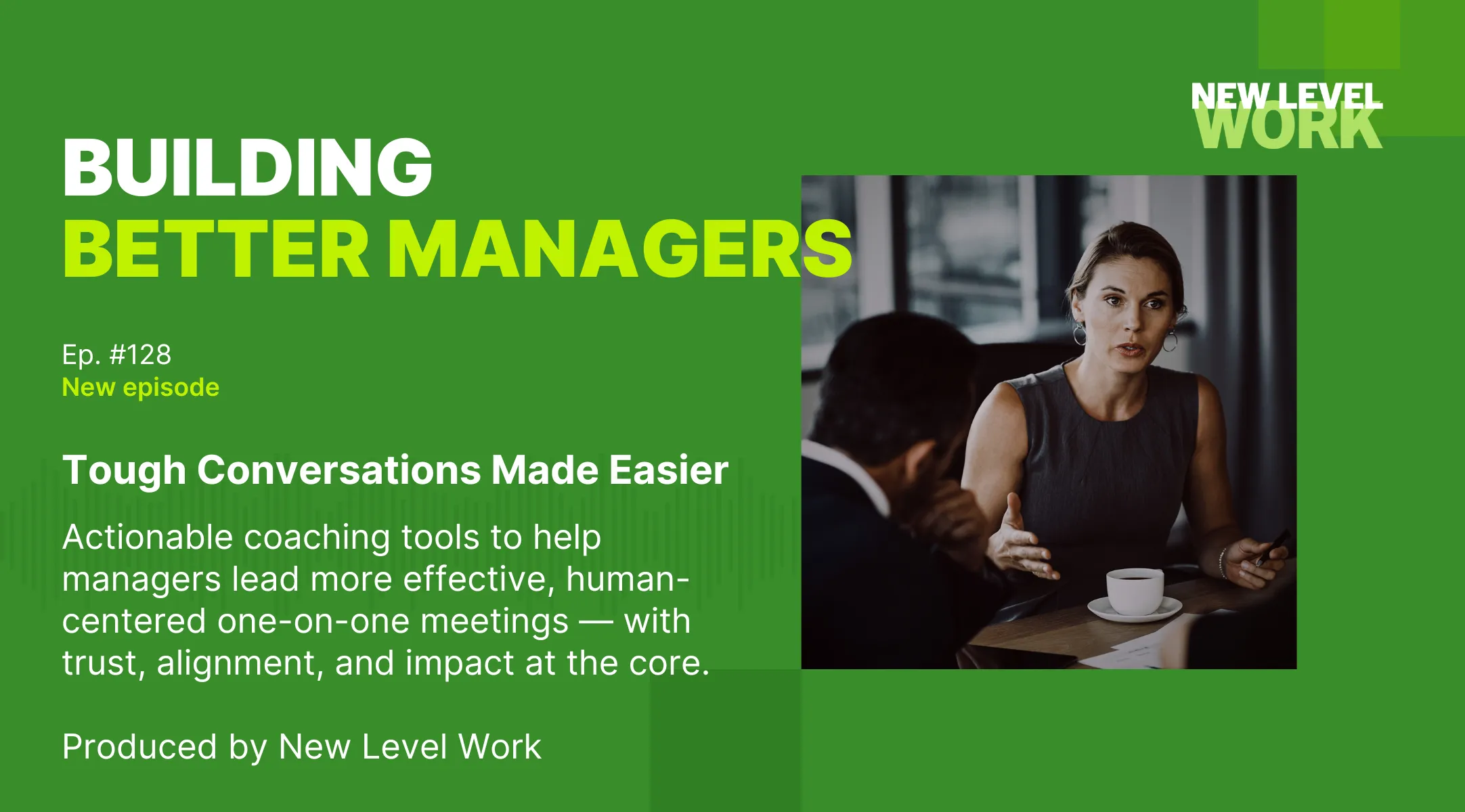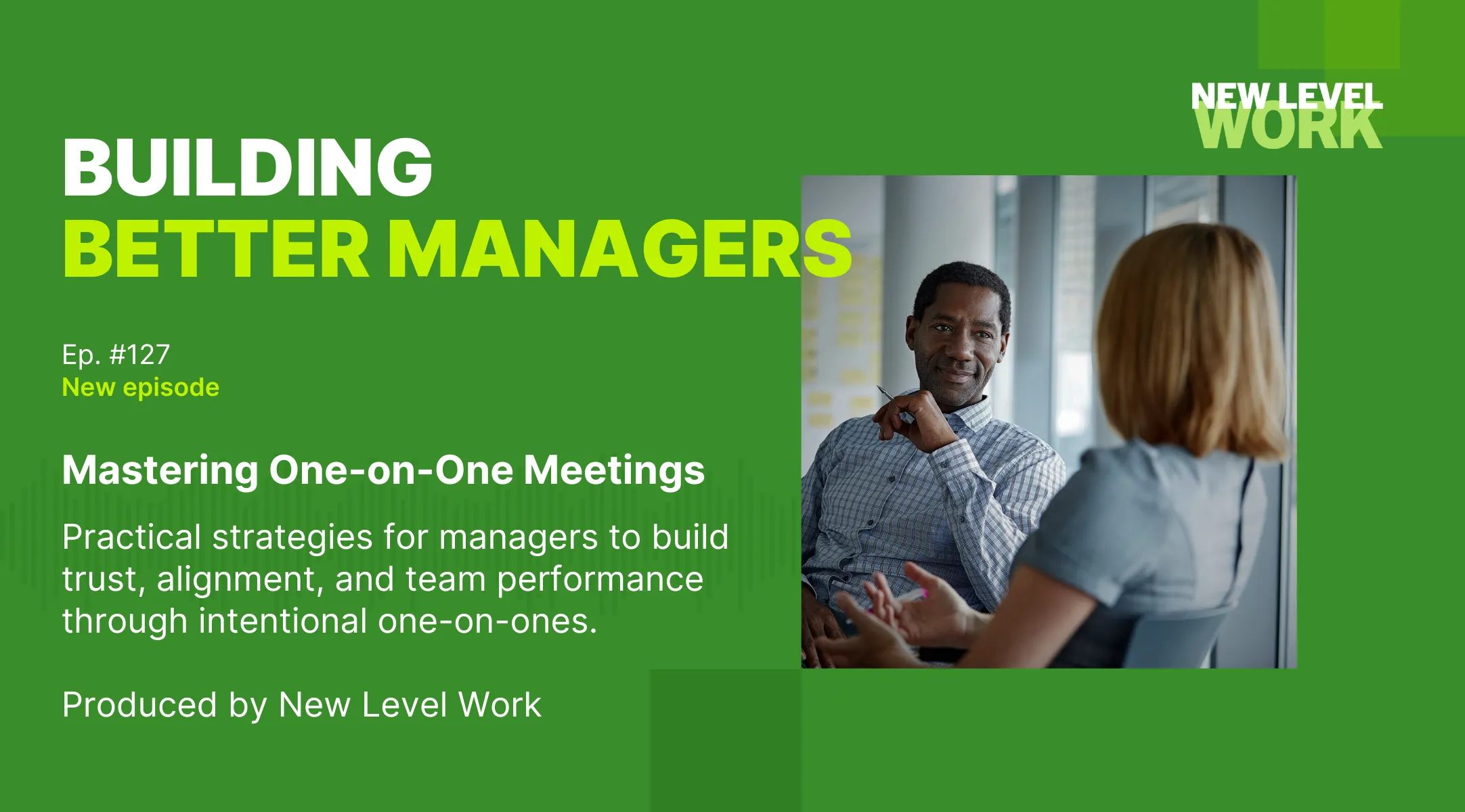Mastering Constructive & Positive Feedback with the SBI Model | Ep. #125

Master the Art of Giving Effective Feedback
In this episode of Building Better Managers, we take a deep dive into one of the most critical skills in leadership: giving effective feedback. Whether you’re delivering constructive insights or recognizing great performance, your ability to communicate feedback can shape the growth, trust, and culture of your entire team.
This episode introduces the SBI Model — Situation, Behavior, Impact — a practical, repeatable structure adapted from the Center for Creative Leadership. You’ll hear specific examples, neuroscience-backed benefits of positive feedback, and the exact steps managers can take to create two-way, psychologically safe conversations that inspire change and reinforce great work.
Key Takeaways:
- Constructive feedback is about raising awareness, not just correcting behavior.
- SBI (Situation, Behavior, Impact) is a clear structure that helps managers be more consistent, specific, and authentic.
- Managers should invite self-reflection first, then ask permission before offering feedback.
- Emotional composure is non-negotiable — never deliver feedback while angry or reactive.
- Effective feedback must connect behavior to impact — that’s what makes it stick.
- Positive feedback is equally powerful, activating dopamine in both giver and receiver to reinforce good habits.
- The most effective leaders give more positive reinforcement than correction.
- Leaders who master feedback drive stronger performance, deeper trust, and better results.
Call to Action:
If you’re ready to help your leaders grow through intentional feedback and coaching, reach out to New Level Work to learn how we can support your organization with human-led development programs backed by data and AI.
0:00
Okay, let's talk about feedback. How many times have you tried to give feedback, maybe especially the constructive kind, you know, when performance needs a bit of an adjustment and you just watch the other person immediately put up that defensive wall?
0:13
Oh, yeah, it happens all the time. It's really frustrating, isn't it? It
0:17
is, yeah, because you're genuinely trying to help. You want to inspire real growth, but somehow the conversation just lands completely wrong,
0:25
right? And you wonder, why do some leaders seem to navigate this so smoothly? They get through the resistance, they inspire action.
0:32
Well, the rest of us kind of struggle Exactly. Well, welcome to this deep dive. Glad to be here today. We're really digging into the mechanics of effective communication, because, honestly, it's such a foundational skill for any leader. Absolutely critical this is building better managers, and we're produced by new level work. They're a company really focused on building exceptional leaders, you know, at all levels within organizations.
0:57
And our mission today for you listening is really to move beyond just, well, generic advice. We want to equip you with a precise, pretty powerful framework. We're focusing on a specific tool that helps ensure your feedback, whether it's constructive or positive, is consistent, really specific and feels authentic. Makes sense? Yeah, the main goal here is to help you cultivate lasting, positive behavior in your teams, and, honestly, to awaken those leadership traits that might be lying dormant.
1:29
Okay, let's unpack that. So this tool the sort of shortcut you mentioned, yeah, that's the SBI model, right? Situation, Behavior, Impact,
1:36
that's the one SBI it's a really easy to remember structure, and it's fantastic for pretty much any feedback conversation you need to
1:42
have. So why? I mean stepping back? Why is feedback so important? Is it really more than just a performance review checkbox?
1:48
Oh, absolutely, it's so much more. Look consistent, high quality feedback isn't just nice to have. It's a vital form of communication. When you deliver it with genuine honesty and respect, it does several things. It actually advances performance. It boosts business results, okay, the practical side, yeah, but crucially, it also builds self esteem and trust within the team. That's how you foster a culture where people want to learn and grow continuously, instead of, you know, a culture of fear or just stagnation.
2:18
It really is the currency of high performing teams, isn't it? And that opportunity for managers to grow people awaken leadership, it totally hinges on being consistent, specific and authentic in how you communicate.
2:33
You really can't delegate that responsibility away, no way. And that's where the SBI model, that consistency piece, really helps. It's adapted from work by the Center for Creative Leadership, and it's just a simple mnemonic Situation, Behavior impact. It gives you that structure so you don't accidentally fall back on vague, maybe judgmental comments, like you just need to be more proactive. What does that even mean?
2:52
Yeah, that's useless feedback. Yeah. Okay, so here's where I think it gets really interesting, especially with constructive feedback. That's always the trickiest, the riskiest, maybe definitely feels that way. Sometimes we need to sort of shift our mindset, right? It's not really about correcting behavior. It's more about increasing awareness.
3:09
Exactly that awareness piece is paramount. Think about it. You can't consciously change habits or actions if you're not even aware you're doing them or aware of their impact,
3:21
makes total sense. So if we're thinking practically logistics, timing matters here, doesn't it?
3:27
Timing is crucial. You generally want to address the behavior you're concerned about as soon as reasonable possible, while the situation is still fresh in everyone's mind. Okay, but, and this is a huge caveat, never, ever deliver constructive feedback if you're feeling angry or upset, right? Bad idea, terrible idea. Just wait, take a break, calm down, regain your composure,
3:48
because the second that strong emotion takes over. It stops being coaching, and it just feels like criticism, right? And you lose all the trust you might have
3:55
built precisely when you wait until you're calm, you ensure the feedback comes from a place of professional objectivity. You're focusing on the impact of the behavior, not making it personal about the person.
4:08
That composure piece feels non negotiable for it to work,
4:12
it really is. So okay, let's get practical. Let's break down the actual steps for delivering constructive feedback using SBI. And remember, the goal isn't a lecture. It has to be a two way street, a conversation focused on finding solutions. Okay, step by step, what's first? Step one is maybe the most important for lowering that defensiveness we talked about. Invite reflection first.
4:34
Okay, so don't just jump in with what you saw. No.
4:37
Start by asking the team member for their perspective on what happened. So instead of listing their mistakes, you might say something like, Hey, regarding that presentation to the stakeholders yesterday, what were your observations? How do you think that conversation went?
4:49
That gives them a chance to self assess? First, I like that. It gives them some agency, exactly.
4:55
And once they've shared their view, and maybe they'll bring up something you didn't even realize, then you move to step. Too. Seek permission. Seek permission. How does that work? You offer your own observations, but you ask if they're actually ready and open to hearing them. Something like, Okay, thanks for sharing that. I have a few observations about the situation too, things I think might be helpful. Are you open to hearing that feedback right now?
5:18
Hmm, that feels very respectful. It ensures they're actually listening, not just bracing for impact.
5:25
Yeah, but I can hear some managers thinking, won't that sound kind of forced, like some corporate script? And what if they actually say, No,
5:33
that's a fair challenge. Look, authenticity matters, so you adapt the wording to your style, but the principle of asking is key. If they say no, you respect that, but you immediately reschedule. It signals, look, this conversation is important. We need to have it. But I respect your headspace right now. But honestly, if you've done step one, well, invited their reflection, you've usually built enough psychological safety that they are ready to listen. That
5:59
makes sense, that psychological safety really is the foundation, isn't it totally okay?
6:04
So they've reflected, they've said yes. Now step three, deliver the SBI feedback itself,
6:08
right? And this is where you need to be candid, direct, but most importantly, specific. Let's maybe use an example that's a bit higher stake, something relevant for managers listening. And let's focus not just on hurt feelings, but tie it to the business impact.
6:22
Good call. So the SBI template is basically when you did x, Situation, Behavior y have an impact. So an example might be in last Thursday's planning session. Situation, you decided to pull two team members onto that new unscheduled project without discussing it. First behavior, okay, specific behavior. The impact was that we then missed the deadline for the quarterly compliance audit, which is a serious issue, business impact, and it also left those two team members with conflicting priorities, which kind of lowered morale, emotional Team Impact.
6:55
See that clarity is powerful. You're linking the specific action, pulling the team members directly to a measurable consequence, the missed deadline and an emotional one, the morale dip. That's what makes the feedback stick
7:08
right. Without that eye for impact, it just sounds like you're complaining or judging
7:12
them exactly. It moves it from opinion to observation of consequence.
7:16
Okay, so that's s, B and I delivered. What's the final step? Step four.
7:21
Step four is guidance and follow up. But crucially, this needs to be solution focused and really center on their ownership of the solution. Don't just jump in and tell them what to do. Ah, okay. Coach them towards it. Yes. Ask questions things like, okay. So given that impact, what steps do you think you could take to make sure this kind of priority conflict doesn't happen again,
7:43
right? Or what sort of time frame seems realistic for making those changes? How
7:49
can I support you in doing that? Are there any obstacles I can help remove, or even reflecting back what worked in that situation, what didn't what might you do differently next time asking
7:58
those what might you do differently. Questions really drives home the accountability and keeps it focused on moving forward. That feels like real coaching. It is. That's the goal. Okay, this is super helpful for the tough conversations, but let's, let's shift gears a bit. We can't spend all our energy just fixing problems. We also need to reinforce what's going well, right? Positive
8:20
feedback. Oh, absolutely critical. Effective positive feedback is just as vital, maybe even more so in some ways. Why is that? Well, for a start, it reinforces positive behaviors. It helps turn those good actions into consistent habits. It builds trust like crazy, and it directly shows your team members that you actually see and value their efforts. Yeah,
8:41
that recognition piece is huge. It inspires that self leadership, doesn't. It makes people want
8:45
to take ownership. It really does. And what's truly fascinating here is the neuroscience behind it. There's actual brain chemistry involved. Oh, really, tell me more. Okay, so when we give or receive genuine positive feedback, our brains release dopamine, the feel good chemical, exactly. It's a powerful neurotransmitter linked to pleasure, reward, motivation, and when it's released in the receiver's brain after they've done something well and been recognized for it, it actually strengthens the neural pathways associated with that positive behavior. It literally makes them more likely to repeat it, because the brain says, Hey, that felt good. Do that again. Wow.
9:21
Okay, so positive feedback is literally wiring their brain for success
9:26
in a way. Yes, consistent, sincere, positive feedback leads to healthier habits and higher performance. But here's something often missed. What's that the benefit isn't just for the receiver. The dopamine release happens in the giver's brain too.
9:40
No kidding, so I feel good giving positive feedback.
9:43
Yes, when you as a manager give sincere praise and see that positive reaction, that act of giving feedback becomes rewarding for you as well. It creates this positive feedback loop. It reinforces your behavior of engaging positively with your team, which leads to you being a better more. Engaged leader Overall, it's a win win that's
10:02
actually quite powerful. So giving positive feedback is like self reinforcing leadership optimization. Ah, I like that. Yeah, you could definitely frame it that way. Okay, so if it's that beneficial, we should probably be as intentional about positive feedback as we are about constructive are there steps for doing positive SBI well, to maximize that neurological benefit,
10:24
absolutely, it mirrors the constructive process and structure, but the tone is obviously different. Four steps again, okay, lay them out for us. Step one, describe the situation, be specific. Anchor the praise in reality. Don't just say you're doing great. Say during the q3 project review presentation to the VP of Finance yesterday morning. Context matters,
10:44
right, verifiable detail. Step two.
10:46
Step two, share the specific behavior or the positive actions you observed or maybe heard about from a reliable source against specifics. Not just you are great, but you proactively address those three potential budget sticking points before the VP even had a chance to raise them. Okay, clear action. Step three. Step three, detail the specific positive impact of their behavior, connect their action to a successful outcome. So you might say, because you front loaded that information and handled those concerns proactively, the entire presentation finished 10 minutes early, we avoided any unnecessary fiction. And guess what, we secured immediate sign off on that budget increase we needed.
11:28
Wow. The difference between just saying good job in the meeting and that detailed breakdown is, well, it's night and day, isn't
11:36
it? Huge difference. The specificity makes it meaningful and memorable. And finally, step four, formally express appreciation. This is where you can connect the action to their positive personal qualities. Acknowledge the effort their skills. How would that sound? Something like, I really appreciate your strategic foresight and how prepared you were for that meeting. That's exactly the kind of ownership and proactive thinking we need at this level. It reinforces their belief in their own capabilities.
12:00
Okay, Situation, Behavior, Impact, appreciation for positive feedback. Got it? Yeah, so pulling all this together, what does this all mean for the manager listening right now? What are the absolute must do's
12:15
right? The quick takeaways, if we synthesize everything successful feedback delivery, whether it's constructive or positive, really boils down to a few critical elements, okay. One, your feedback has to be consistent, specific and authentic. Consistency makes it normal, not a scary surprise. Specificity makes it actionable. Authenticity makes it believable, makes sense. Two, maintain your emotional composure, especially when it's constructive feedback. Never deliver it angry. Wait until you're calm. Non negotiable. Three, three, ensure the conversation is genuinely two way. It's not a monolog. Use active listening. Ask questions, understand their perspective before you jump to conclusions or
12:54
solutions crucial for trust and four and
12:56
four always, always, always connect the behavior to the impact, whether it's a positive impact you want more of or a negative impact that needs to
13:03
change that connection behavior to impact. It feels like the secret sauce, doesn't it? Yeah, it shifts the focus from judging the person to discussing the results of their
13:13
actions precisely. It makes it objective about the work, not about their personality, and mastering this SBI model really practicing. It transforms feedback from this like dreaded obligation into a genuinely powerful tool, a tool for cultivating leaders on your team, for boosting the whole organization's results, and for building a team culture based on trust and growth.
13:37
That really wraps up our deep dive into the SBI framework. Nicely, we've seen how having this structure, Situation, Behavior impact gives you the scaffolding you need for those tough conversations, but also for celebrating the wins that build momentum.
13:52
It really does provide that clarity and confidence. So for everyone listening, if you're thinking about how to bring these kinds of structured insights, maybe human led coaching or team development programs often enhanced by data and AI these days to your own leaders, you should reach out to new level work to learn more. They really specialize in building better leaders at all levels. It's a natural next step, if this resonates
14:13
absolutely well. Thank you for joining us for this deep dive on building better managers produced by new level work. Pleasure to be here now before we go, here's maybe a final thought for you to go on this week. Think about your own feedback habits. How much of your current feedback focuses only on closing gaps, the constructive side, versus how much focuses on reinforcing strengths, the positive side? Oh, interesting question. Yeah, because the research actually suggests that the most effective leaders, they spend significantly more time reinforcing success than they do correcting mistakes. So just ask yourself, What does your current balance look like? Something to think about.










